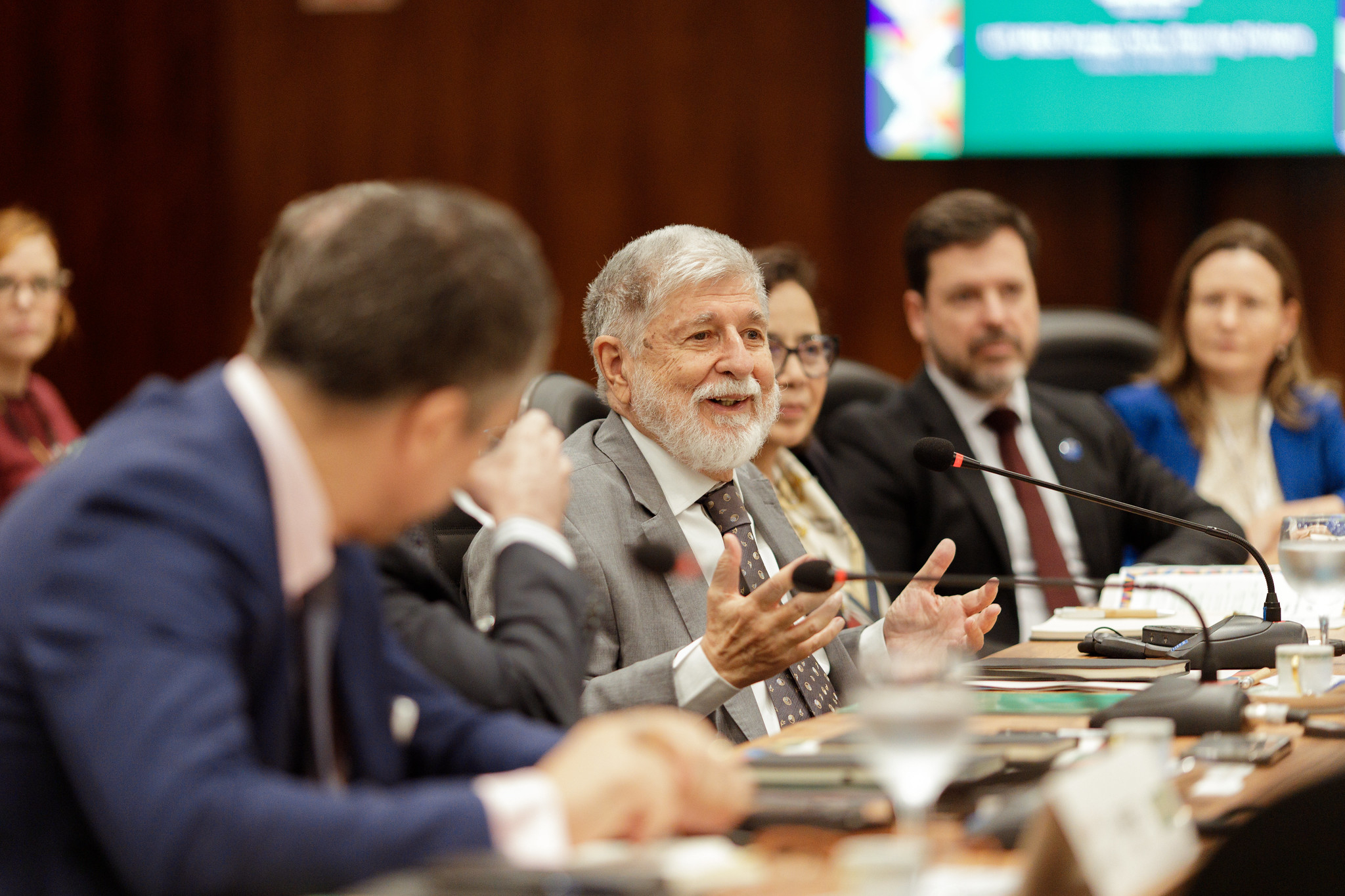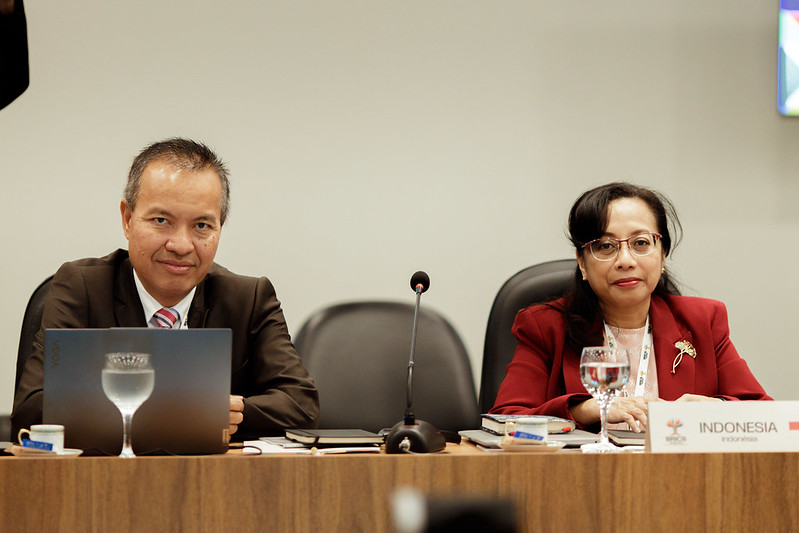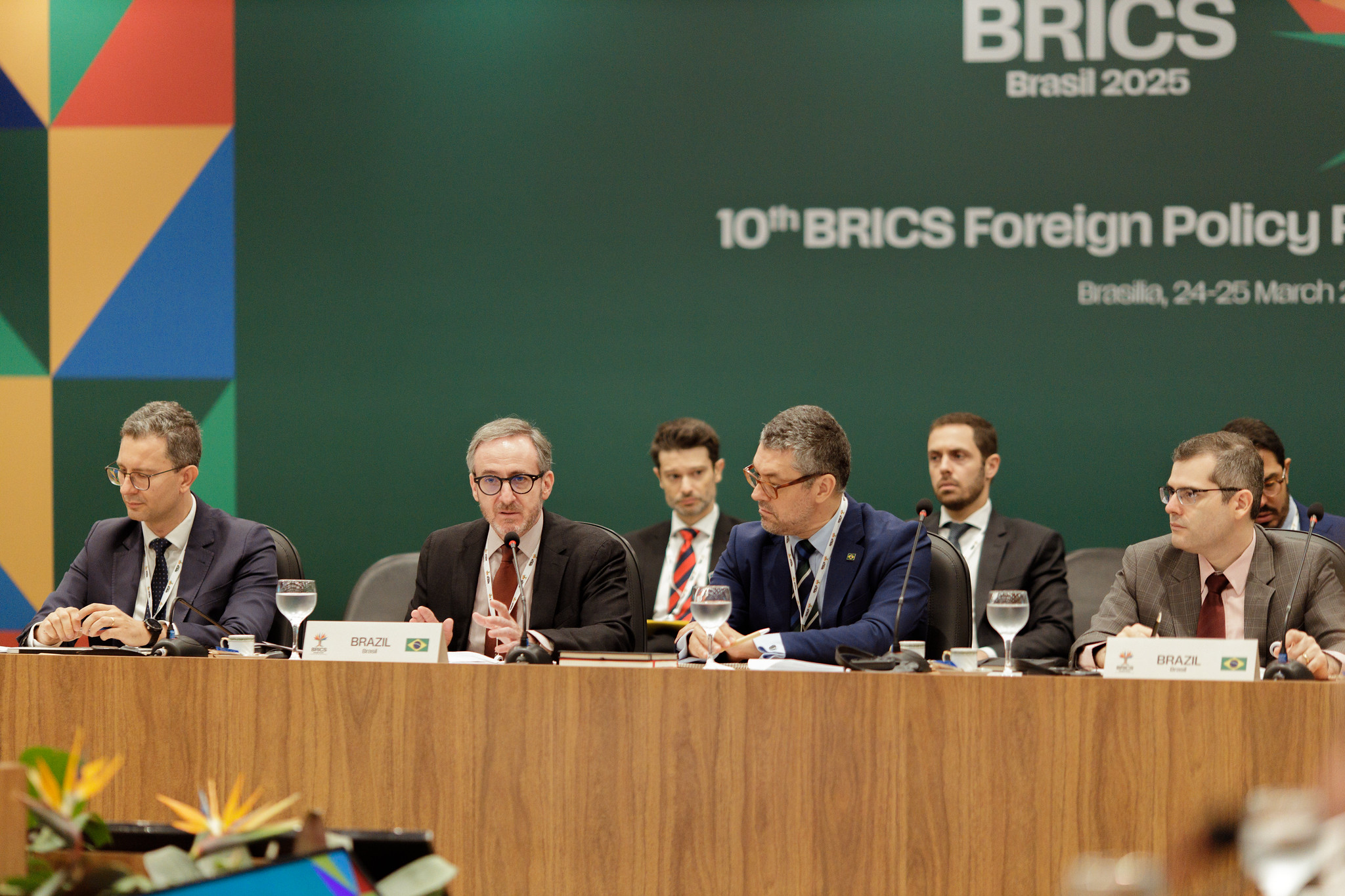BRICS is not "anti-West" but strives for geopolitical balance, says Brazilian ambassador
One of the founders of BRICS and current special advisor to the Presidency of Brasil for International Affairs, Celso Amorim reiterates the role of the group as a multilateral alternative. Amorim took part in the 10th BRICS Policy Planning Dialogue held in Brasília this week.

By Leandro Molina | leandro.molina@presidencia.gov.br
The tenth edition of the BRICS Policy Planning Dialogue took place over two days of intense discussions at the Itamaraty Palace in Brasília. The priority discussions included best practices in foreign policy planning, and an analysis of the most recent activities of the Policy Planning Offices of each country in the group. Another point of discussion focused on a “horizon scanning” exercise in which participants assessed global geopolitics and trends in the international system. The BRICS proposal to contribute to a global governance reform was one of the main topics that were discussed, including the analysis of a more just and democratic world order — a topic that has been discussed by the group since last year.
A key priority of the Dialogue is the exchange of assessments on regional and international developments, with special attention to Global South issues — often neglected in traditional forums. The work also sought to identify areas of convergence in the policies of BRICS members and to foster a space for reflection on future avenues of cooperation, promoting closer relations within the group.
One of the participants was Ambassador Celso Amorim, current special advisor to the Presidency of Brasil for International Affairs and one of the founders of BRICS. Amorim observed that the BRICS Foreign Policy Planning Dialogue — result of a proposal made by the Brazilian presidency of the group in 2014 — is a milestone in informal discussions between the ministries of Foreign Affairs of member countries. Amorim mentioned that the first event of this nature was held in 2015, in Russia, and that, since then, the Dialogue has been held annually, focusing on the needs and priorities of the Global South.
When revisiting the origins of the group, Ambassador Celso Amorim reiterated the role of BRICS as a pro-multilateralism and development force, denying claims that it would be an "anti-West" alliance. Amorim, who participated in the first BRICS negotiations — then composed by Brasil, Russia, India and China, before South Africa joined — highlighted the evolution of the group: "BRICS was born from a convergence of interests — including the idea of IBSA: India, Brasil, South Africa — and today represents a geopolitical counterweight." Regarding the recent expansion to 11 members, the ambassador admitted that complexity has increased, but defended inclusion: "Africa and the Arab world needed representation; Indonesia, whose population is larger than Brasil, also needed it," observed the ambassador.
"BRICS is not anti-West, it is pro-balance"
Regarding the perception that the group is an alliance against the USA, Celso Amorim was emphatic: "We are not 'anti'. We are pro-development, pro-multilateralism and pro-social justice". As an example, the ambassador mentioned the "Friends of Peace Initiative" — a group organized by Brasil and China that brings together mostly countries from the Global South. The ambassador acknowledged that expansion requires more diplomatic work, but stressed: "That is what diplomacy is for". Regarding the global scenario, Amorim mentioned the "two major changes of the last 30 years: the end of the USSR and the crisis of US-led multilateralism," arguing that BRICS offers an alternative.
"We are not 'anti'. We are pro-development, pro-multilateralism and pro-social justice"
The ambassador also highlighted the importance of Brasil in the group and the intense agenda of ministerial meetings during the presidency of Luiz Inácio Lula da Silva, including meetings of national security advisors. "Brasil has already made history in BRICS, and the group will make history in the international order," he concluded.

Broad discussions on foreign policy
The main feature of the BRICS Policy Planning Dialogue is its comprehensive format, in which authorities responsible for foreign policy planning of member countries discuss relevant topics without the pressure of producing a final document.
It is not a forum for formal decisions, but rather a place for the exchange of views, in which it is possible to reflect on the most current issues and challenges that shape the future of the international system and of BRICS itself.
In 2024, during the Russian presidency of BRICS, the event gained a new dynamic by returning to the in-person format after four years of virtual meetings due to restrictions imposed by the pandemic. The Dialogue held in Moscow was also the first to include the new BRICS members, bringing a new perspective to the discussions and helping to strengthen collaboration between the countries — thus promoting better understanding among the parties.
In January 2025, Indonesia became a full member of BRICS. This was the first expansion of the group under the Brazilian presidency, which began on January 1. The Brazilian Ministry of Foreign Affairs (Ministério das Relações Exteriores/MRE) welcomed Indonesia, highlighting the country as "the largest economy in Southeast Asia" and its alignment with BRICS objectives.
Indonesian Ambassador Spika Tutuhatunewa, representing the Foreign Policy Strategy Agency of the Indonesian Ministry of Foreign Affairs, expressed enthusiasm for the country's recent accession to BRICS. She spoke of the importance of multilateral conversations during her participation in the BRICS Policy Planning Dialogue in Brasilia. "We are very excited to become members of BRICS and to participate in this dialogue for the first time," she said. Spika stressed that the discussions — divided into topics such as geopolitics, geoeconomics, and regional development — allowed the Indonesian delegation to understand the positions of each member country and their views on global challenges.
Speaking about the country's areas of focus within the group, Ambassador Spika Tutuhatunewa highlighted the search for practical and inclusive cooperation, mentioning areas such as climate change, artificial intelligence governance, digital transformation, and food and energy security — the latter a priority for the new government of Indonesian President Prabowo Subianto. "We can move forward in more concrete ways, and Indonesia wants to work with the other members to strengthen this new order," she added, reiterating the commitment to a less centralized and more representative global system.
Internal BRICS cooperation is also a key focus of discussions towards strengthening coordination among member countries. This is essential to ensure that the group, composed of emerging economies such as Brasil, Russia, India, China, and South Africa, continues to play an important role in shaping global governance and promoting a more balanced international order.
The BRICS Policy Planning Dialogue is an opportunity to discuss foreign policy issues — a platform to strengthen relations among member countries and to reflect on the future of global governance. By bringing together the world’s developing economies, this year under the presidency of Brasil, the Dialogue is as an essential element in the search for a more inclusive and fair world order, reflecting the needs of an increasingly multipolar world.

Advances and challenges in the global geopolitical scenario
The head of Brasil's political planning office Ambassador Sérgio Rodrigues do Santos coordinated the Planning Dialogue. He stressed the importance of dialogue among member countries to analyze geopolitical trends and strengthen the group's coordination.
The ambassador explained that this discussion format was a Brazilian initiative proposed during the BRICS presidency in 2014. “The meeting was an opportunity for foreign policy planners from the BRICS countries to discuss global geopolitical events and trends in the international system”, he pointed out.
Santos considers that having different points of view on the same situations that the world is facing today is enriching — emphasizing that the debate includes topics such as reform of global institutions, a point of convergence among the group's members, according to him.
Despite agreement on topics such as multilateralism and global governance, Ambassador Rodrigues clarified that the group does not have a mandate to negotiate common positions or joint statements. "Our role here is to exchange mutual assessments of the international system. The information discussed is taken to each Ministry of Foreign Affairs and serves to support analyses that support the implementation of each country's foreign policy," he explained.
The meeting took place at a time when BRICS is expanding from five to 11 members, and when the group is increasingly taking a leading role in debates on the multipolar order, trade in local currencies, and reform of institutions such as the UN and the IMF. Brasil, which chairs BRICS, has strengthened its role as a bridge between the Global South and emerging economies, aligning itself with issues such as international peace and sustainable development.
The Planning Dialogue was attended by several delegations from BRICS countries. It also provided an opportunity for a cultural tour of the Itamaraty Palace, headquarters of the Ministry of Foreign Affairs, designed by Oscar Niemeyer and considered one of the most iconic buildings in Brazilian modern architecture.